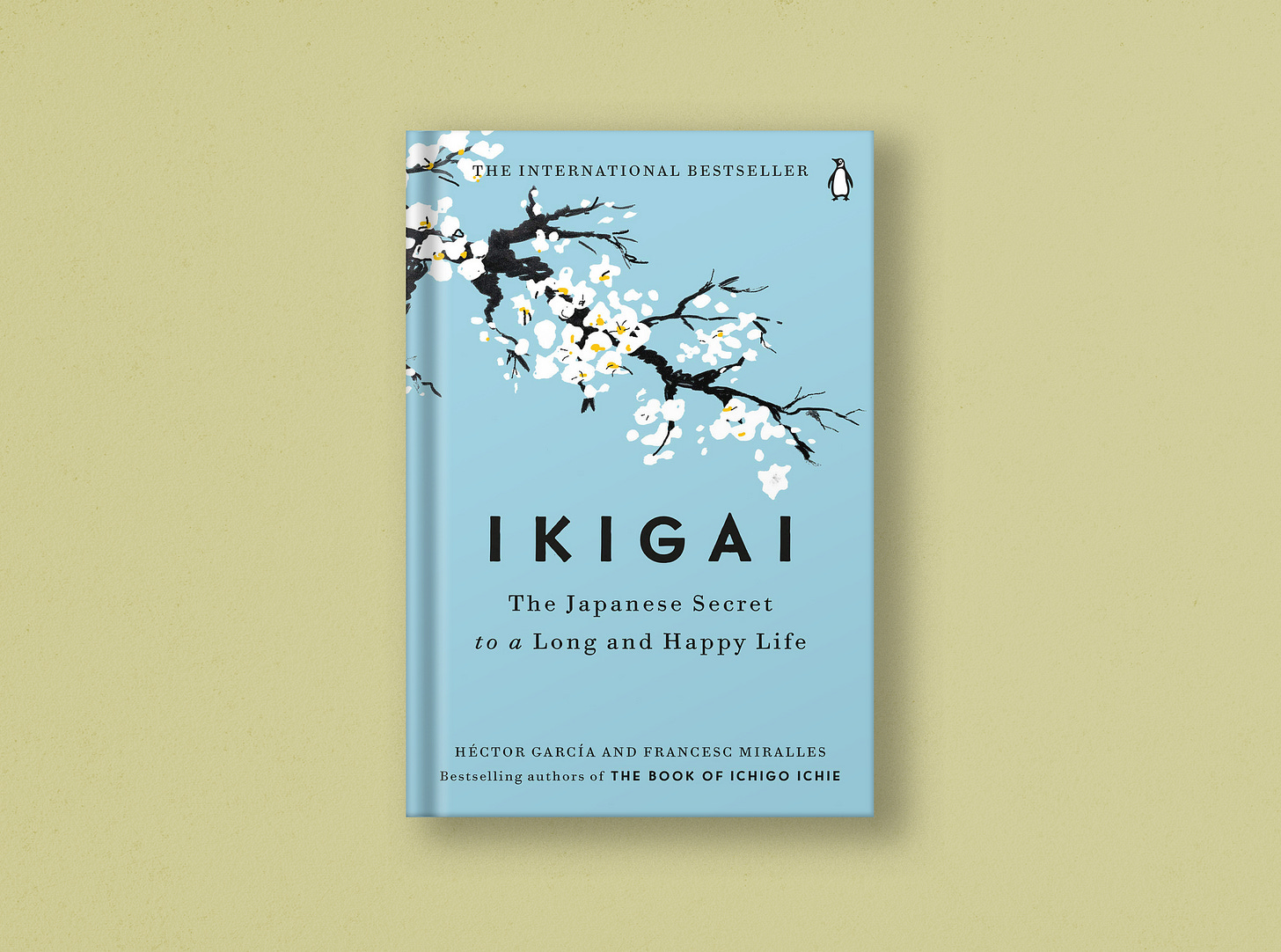Ikigai
Written by Hector Garcia and Francesc Miralles.
⏱️ The book in three sentences
We like to make life more complicated than it needs to be.
A simple life, full of good food, good people and hobbies, is what keeps the mind and body young.
Rural Japanese culture embodies this idea and facilitates the long lives they live.
🪞 Reflections
Ikigai's cover is subtitled "The Japanese Secret to a Long and Healthy Life." It invokes a kind of mystery. Some sort of undiscovered eastern formula for attaining the almost unnaturally long lives experienced by the island's people. Yet the secret only runs surface deep. The book is not long, but it's so broad and so shallow that its contents could probably be reduced to a single-page summary without losing any of the little impacts the book provides.
On one hand, Ikigai is a light and interesting exploration of a beautifully foreign culture to our own. One of the things I dislike about reading traditional history books is that the contents are entirely focused on the few major events within a given century and the characters are often restricted to the royalty, nobility and revolutionaries of the time. That's not to say that these topics aren't interesting, but they frequently pass over what the daily lives of commoners looked like. What did the average person eat? How was the nuclear family structured? What did they do in their free time? These are really interesting questions and Ikigai meets them with modern-day answers. From an anthropological perspective, the book is a nice entry-level overview of what rural Japanese life looks like today.
On the other hand, the book attempts to frame itself as a reference point for finding ikigai, which according to the authors can be translated roughly into "purpose" or "meaning". In fact, this is the primary perspective of the book and concurrently where everything falls off the rails. The authors cover an extremely broad range of topics from stress management to logotherapy to diet to activity. Yet each chapter is so brief that many sections nearly amount to mere bullet points. How the authors expect to make an impact on the complex and philosophical discussion of meaning remains a question to be answered.
Topics, where they do go into greater depth, are generally just summaries or references to more popular books like A Man's Search for Meaning by Victor Frankl or Antifragile by Nassim Nicholas Taleb. Worse, the authors are terribly unfaithful to the science they choose to deploy. As the book is about the Japanese lifestyle, much of the evidence provided for lifestyle advice is inherently anecdotal. That can be forgiven. But the authors are also annoyingly selective when the scientific literature supports their arguments, and ignorant to the science when it does not. It's jarring to read and upends the integrity of the book.
Beyond science though, the external references for argumentative support are also strange. In one paragraph the authors will discuss the religious beliefs of village inhabitants and in the next, they will be discussing various Chinese belief systems, Buddism and Stoicism. What is the relevance? Why is it relevant? I struggle to find the connection between a Hellenic school of philosophy dating back to the third century BC and the independently developed, spiritual, shamanistic belief system of the rural Japanese. It's either a forgivable but poorly executed attempt to relate Eastern culture with our own or it's an unforgivable scream of misunderstanding between the differences between Japanese and Greco-Roman theory. Many fundamental ideas across global religions are the same but that doesn't make any religion inherently related to the other. It's advice written for the sake of writing advice, rather than for the sake of providing any true insight - something that could be said for much of the book.
Ikigai is a book on Japanese culture packaged and sold as a health and lifestyle point of reference. If you're interested in learning about Japanese culture beyond the bounds of Tokyo or Japanese urbanism, Ikigai may be a suitable jumping-off point. However, I would venture to guess there are better sources out there. If you're interested in learning about health in mind, spirit and body, look elsewhere.
💥 Personal impact
For what Ikigai set out to achieve, its impact ranges from marginal to zero. But it has influenced my interest in visiting Japan! I've had Japan at the top of my Asian travel bucket list for a long time. The towering megacity of Tokyo, the beautiful wooden architecture with winged roofs and sliding doors, Mt.Fuji, sushi, Pokemon! It all cumulates into a huge allure for me. Nonetheless, I had never considered visiting the rural outer-archipelago of Japan. Beyond my limited knowledge of pre-WWII Japan and Martin Scorsese's Silence, rural Japan remained out of range for my understanding.
Ikigai changed this for me. Learning about the simple life and culture of Japan outside of the country's urban centres was intriguing. I don't think any future travel plans would be completely upended, causing me to spend a large amount of time in these countryside destinations, but when I do visit, a few days in a town like Okinawa may be worthwhile.
🗣 Top three quotes
"Many such artists might seem misanthropic or reclusive, but what they are really doing is protecting the time that brings them happiness, sometimes at the expense of other aspects of their lives."
"Japanese architecture, on the other hand, doesn’t try to be imposing or perfect, because it is built in the spirit of wabi-sabi. The tradition of making structures out of wood presupposes their impermanence and the need for future generations to rebuild them. Japanese culture accepts the fleeting nature of the human being and everything we create."
"Life is not a problem to be solved."

